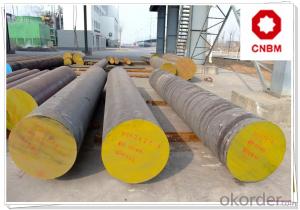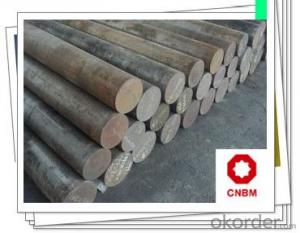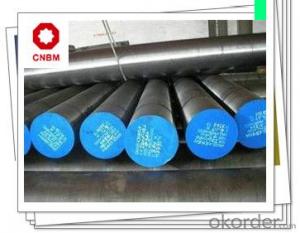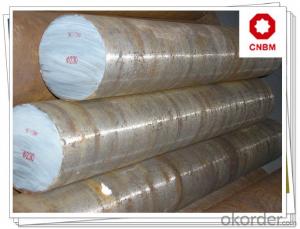Carbon Steel Bar 1020 S20C C22
- Loading Port:
- Shanghai
- Payment Terms:
- TT OR LC
- Min Order Qty:
- 30 m.t.
- Supply Capability:
- 120000 m.t./month
OKorder Service Pledge
OKorder Financial Service
You Might Also Like
Carbon Steel Bar 1020 S20C C22
Specification
Chemical Composition | Mechanical Properties (In Quenched & Tempered State) | ||
C | 0.17-0.23 % | Tensile strength(MPA) | ≥253 |
Si | 0.17-0.37 % | Yield strength (MPA) | ≥245 |
Mn | 0.35-0.65 % | Elongation (δ5/%) | ≥25 |
Cr | ≤0.25 % | Reduction in Area (ψ/%) | ≥45 |
Ni | ≤0.30 % | Impact (J) | ≥ 47 |
P | ≤0.035 % | Impact toughness value αkv (J/cm2) | ≥59(6) |
S | ≤0.035 % | Hardness | ≤156HB |
Cu | ≤0.25 % | ||
1, Diameter: 8mm-250mm rounds
5mm-9mm rods
2, Length: 2m, 3m, 5.8m, 6m or customized
3, Standard: GB, ASTM, AISI, SAE, DIN, JIS, EN
OEM technology - send detailed technical parameters for accurate quotation.
2, Produce Process: smelt iron - EAF smelt billet - ESR smelt billet -
hot rolled or forged to get the steel round bar and plate
3, Heat Treatment: annealing, normalizing, tempering, quenching
4, Surface Treatment: Black, Polished, Galvanized
5, Quality Assurance: We accept third party inspection for all orders.
You can ask testing organizations such as SGS, BV, etc. to test our products before shipping.
Products Show
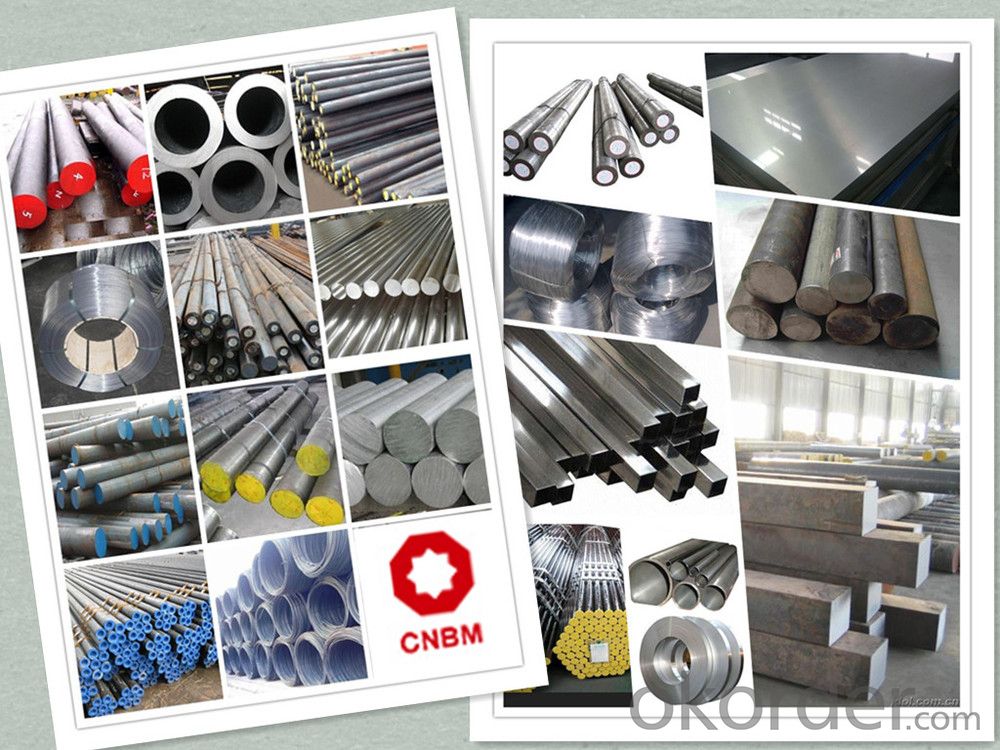
Product Overviews
| Product Name | Typical Grades | Diameter(mm) | Standard adopted |
| Carbon Steel | 20 (1020/S20C/C22) | Ø16-Ø300 |
GB/SAE/JIS/DIN
|
| 40 (1040/S40C/C40) | |||
| 45 (1045/S45C/C45) | |||
| Bearing Steel | GCr9 (51100/SUJ1) | Ø12-Ø250 | |
| GCr15 (52100/SUJ2/100Gr6) | |||
| GCr9SiMn (A485-Gr.1/SUJ3) | |||
Cr-Mo Steel | 20Cr (5120/SCr420H/20Cr4) | Ø12-Ø250 | |
| 40Cr (5140/SCr440/41Cr4) | |||
| 42CrMo(4140/SCM440/42CrMo4) | |||
| Gear Steel | 20CrNiMo | Ø16-Ø600 | |
| 20CrMn(5115/SMnC420/20MnCr5) | |||
| 20CrNiMo(8620/SNCM220/20CrMiMo2) |
Work Shop
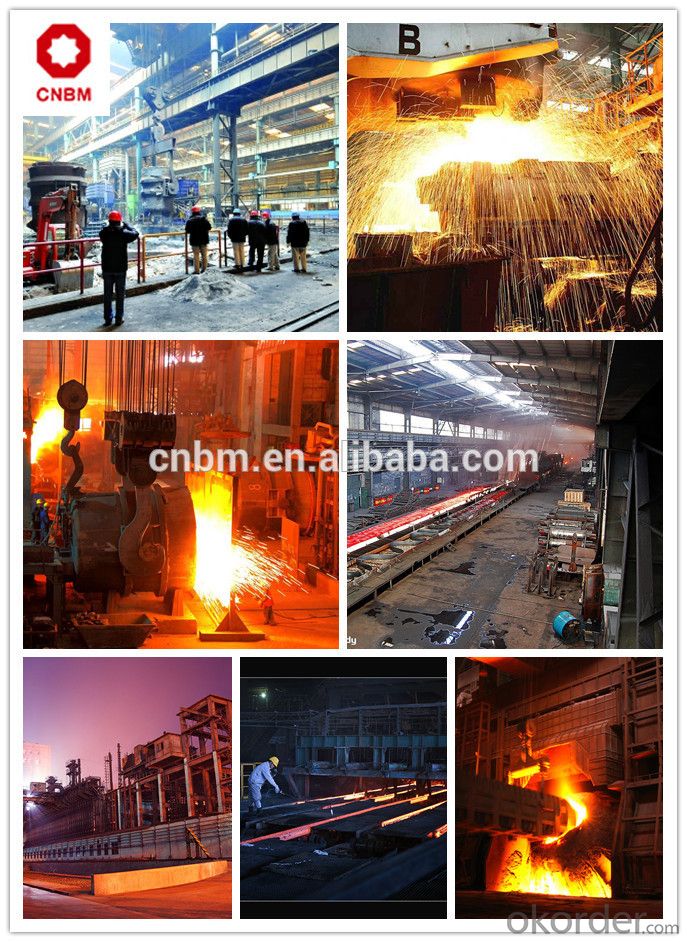
Company Information
CNBM International Corporation is the most important trading platform of CNBM group.
Whith its advantages, CNBM International are mainly concentrate on Cement, Glass, Iron and Steel, Ceramics industries and devotes herself for supplying high qulity series of refractories as well as technical consultancies and logistics solutions.

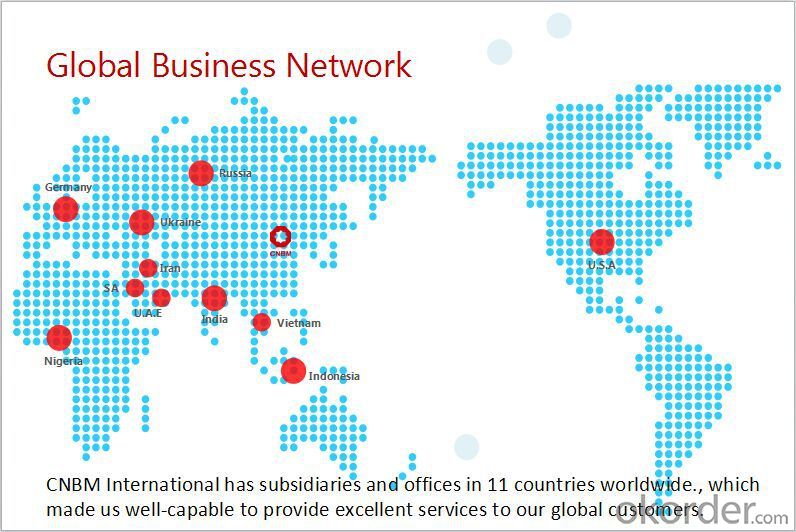
FAQ
1, Your advantages?
professional products inquiry, products knowledge train (for agents), smooth goods delivery, excellent customer solution proposale
2, Test & Certificate?
SGS test is available, customer inspection before shipping is welcome, third party inspection is no problem
3, Factory or Trading Company?
CNBM is a trading company but we have so many protocol factories and CNBM works as a trading department of these factories. Also CNBM is the holding company of many factories.
4, Payment Terms?
30% TT as deposit and 70% before delivery.
Irrevocable L/C at sight.
5, Trading Terms?
EXW, FOB, CIF, FFR, CNF
6, After-sale Service?
CNBM provides the services and support you need for every step of our cooperation. We're the business partner you can trust.
For any problem, please kindly contact us at any your convenient time.
We'll reply you in our first priority within 24 hours.
Packaging & Delivery
1, Packaging: seaworthy package or as required
2, Delivery: 35-45 days or based on quantity
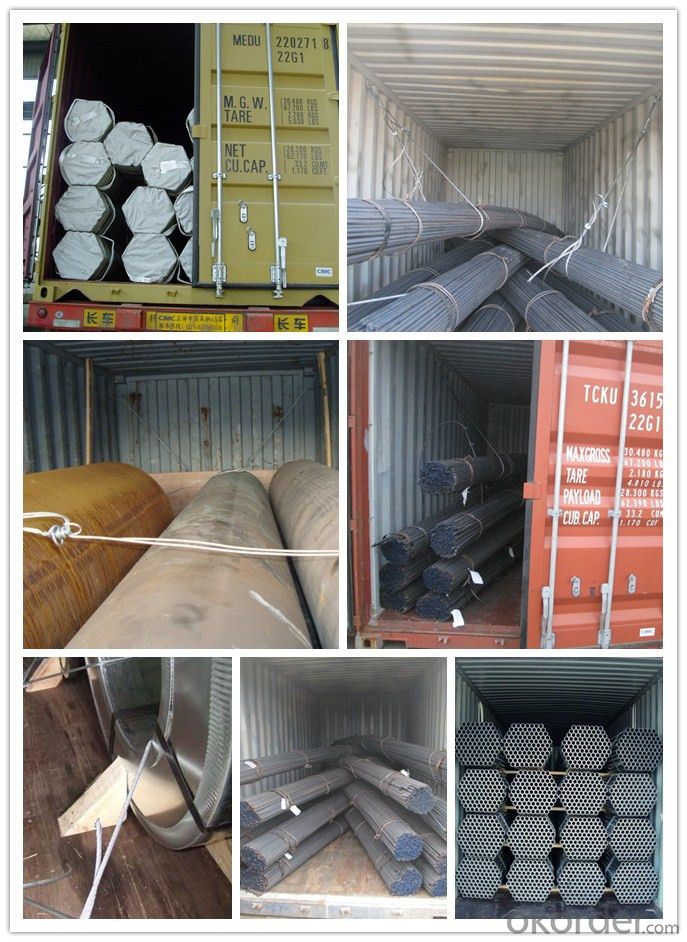
- Q:What are the different types of steel round bar alloys for improved hardness and strength?
- There are several different types of steel round bar alloys that are known for their improved hardness and strength. Some of the most common alloys used for this purpose include: 1. Carbon Steel: Carbon steel is a popular choice for its exceptional strength and hardness. It contains a higher percentage of carbon compared to other alloys, which enhances its overall durability and resistance to wear and tear. 2. Alloy Steel: Alloy steel is a combination of carbon steel and other elements such as manganese, nickel, chromium, or vanadium. These additional elements improve the hardness and strength of the steel, making it more suitable for applications that require high tensile strength and toughness. 3. Stainless Steel: Stainless steel is a corrosion-resistant alloy that contains a minimum of 10.5% chromium. The addition of chromium enhances its hardness and strength, making it ideal for applications that require resistance to corrosion, heat, and wear. 4. Tool Steel: Tool steel is specifically designed to be used in the manufacturing of various tools. It is known for its high hardness, wear resistance, and strength. Tool steel often contains elements such as tungsten, molybdenum, or vanadium to improve its performance. 5. High-Speed Steel: High-speed steel is a type of tool steel that is specifically developed for use in high-speed cutting tools such as drills and milling cutters. It is known for its exceptional hardness and ability to retain its cutting edge even at elevated temperatures. 6. Maraging Steel: Maraging steel is a low-carbon, high-nickel alloy that is known for its exceptional strength, toughness, and resistance to fatigue. It is often used in applications that require high strength and durability, such as aerospace and defense industries. These are just a few examples of the different types of steel round bar alloys that are known for their improved hardness and strength. The specific choice of alloy depends on the intended application and the desired properties required for the end product.
- Q:What is the cost of steel round bars compared to other materials?
- The cost of steel round bars can vary depending on various factors such as the grade of steel, the size and dimensions of the bar, and market conditions. However, in general, steel round bars tend to be more cost-effective compared to other materials commonly used in construction and manufacturing. For instance, when compared to materials like aluminum or titanium, steel round bars are typically more affordable. Steel is abundantly available, making it a cost-efficient choice for many applications. Additionally, steel has excellent strength and durability properties, making it a preferred material for structural purposes. Compared to materials like wood or plastic, steel round bars may be more expensive initially. However, when considering the long-term benefits such as its longevity, resistance to corrosion, and minimal maintenance requirements, steel still offers a cost-effective solution. It is important to note that the cost of steel round bars can vary significantly depending on market conditions, such as the availability of raw materials and the demand for steel products. Additionally, specialized or high-grade steel alloys may come at a higher cost due to their specific properties or manufacturing processes. In summary, steel round bars generally offer a cost-effective option compared to many other materials used in construction and manufacturing. However, it is always recommended to research current market prices and consider specific project requirements before making any final cost assessments.
- Q:Can steel round bars be used for making tools or machinery parts?
- Yes, steel round bars can be used for making tools or machinery parts. Steel round bars are known for their high strength, durability, and resistance to wear and tear. These properties make them ideal for applications in the manufacturing of tools and machinery parts that require high strength and reliability. Steel round bars can be machined, forged, or heat-treated to achieve the desired shape and properties required for specific tools or machinery parts. Additionally, steel round bars come in various grades, each with its own specific properties, allowing manufacturers to select the most suitable grade for their specific application. Overall, steel round bars are a versatile and commonly used material in the manufacturing industry for making tools and machinery parts.
- Q:What are the different types of steel round bar surface finishes for corrosion resistance?
- There are several types of steel round bar surface finishes that provide corrosion resistance. Some common options include polished, brushed, satin, and electropolished finishes. Additionally, coatings such as galvanized, black oxide, and powder coating can also be applied to steel round bars to enhance their corrosion resistance.
- Q:How do you store steel round bars to prevent damage?
- In order to store steel round bars and prevent damage, it is important to follow several crucial steps. Firstly, it is essential to keep the bars in a dry and well-ventilated area to avoid the buildup of moisture, which can lead to rusting. Additionally, moisture can cause the bars to become brittle and weaken over time. Next, it is recommended to store the round bars horizontally instead of vertically. This will prevent warping or bending caused by the weight of the bars pressing down on each other. If vertical storage is necessary, it is vital to use appropriate racks or supports that evenly distribute the weight. Furthermore, it is important to avoid stacking the bars too high, as excessive weight can cause deformation or collapse. If stacking cannot be avoided, sturdy supports should be used and the weight should be evenly distributed across the stack. Moreover, it is advisable to separate different sizes or types of steel round bars to prevent scratching or damage. This can be achieved by using separators or dividers to create distinct compartments for each type of bar. Lastly, regular inspection of the stored round bars for any signs of rust, corrosion, or damage is necessary. If any issues are detected, prompt measures should be taken to address them. This may involve applying rust inhibitors, cleaning the bars, or seeking assistance from professionals. By adhering to these storage guidelines, the steel round bars can be effectively protected from damage, ensuring their longevity and quality.
- Q:Can steel round bars be used for making electrical components?
- Steel round bars can be used for making certain electrical components, but it depends on the specific requirements and applications. Steel is a versatile material with good electrical conductivity and high durability, making it suitable for various electrical applications. However, for certain components that require specific electrical properties or insulation, other materials such as copper or aluminum may be more commonly used. Additionally, steel round bars may need to undergo surface treatments or coatings to prevent corrosion or improve electrical conductivity. Ultimately, the suitability of steel round bars for making electrical components should be assessed based on the specific requirements and regulations of the intended application.
- Q:How can steel round bars be protected against corrosion?
- Steel round bars can be protected against corrosion through various methods such as applying a protective coating, galvanizing, using corrosion inhibitors, or implementing cathodic protection. These techniques form a barrier between the steel surface and corrosive elements, preventing or slowing down the process of corrosion.
- Q:How do steel round bars compare to aluminum round bars?
- Steel and aluminum round bars differ in their properties and applications. When it comes to strength and durability, steel round bars surpass aluminum. Steel exhibits higher tensile strength and can withstand heavier loads and stresses, making it suitable for critical applications like construction or manufacturing machinery. In contrast, aluminum round bars are weaker and more prone to bending or breaking under heavy loads, hence they are typically used in lighter applications or when weight reduction is important. Weight-wise, aluminum round bars are significantly lighter than their steel counterparts. This quality makes aluminum a favored choice in weight-sensitive industries such as aerospace or automotive manufacturing. Moreover, the lightweight nature of aluminum round bars makes them easier to handle and transport. In terms of corrosion resistance, aluminum round bars excel due to the formation of a protective oxide layer on their surface. This layer acts as a barrier, protecting the metal from further corrosion and making aluminum suitable for outdoor applications or environments with high humidity or chemical exposure. On the other hand, steel round bars are more prone to rust and corrosion, necessitating protective coatings or treatments to enhance their resistance. In the cost department, steel round bars generally come out as the more cost-effective option. Steel is widely available and commonly used, making it more affordable in most cases. Conversely, aluminum round bars are pricier due to their production process and higher energy requirements. When it comes to thermal conductivity, aluminum round bars shine. They exhibit excellent thermal conductivity, efficiently transferring heat. This characteristic makes them well-suited for applications where heat dissipation is crucial, such as heat sinks or electrical conductors. While steel round bars do conduct heat to some extent, their thermal conductivity is lower compared to aluminum. Overall, steel round bars offer superior strength, durability, and cost-effectiveness, making them suitable for heavy-duty applications. On the other hand, aluminum round bars are lighter, possess excellent corrosion resistance, and exhibit superior thermal conductivity, making them ideal for lightweight applications and industries where weight reduction or heat dissipation are vital. Ultimately, the choice between steel and aluminum round bars depends on the specific requirements of the application.
- Q:What is the difference between a bright and a hot rolled steel round bar?
- The manufacturing processes and resulting characteristics distinguish a bright steel round bar from a hot rolled steel round bar. To produce a hot rolled steel round bar, the steel billet or ingot is heated to a high temperature and then rolled through a series of rolling mills to achieve the desired shape. As a result, the bar has a rough surface texture with a scale layer on the outside. These bars are commonly used in structural applications where strength and durability are crucial. They have a rough appearance and may require additional processing, such as grinding or machining, to achieve a smooth surface finish. In contrast, a bright steel round bar, also known as a cold drawn or cold finished bar, is created by drawing the hot rolled steel bar through a series of dies at room temperature. This process enhances the dimensional accuracy, surface finish, and mechanical properties of the steel. The resulting bright steel bar has a smooth and shiny surface, devoid of scale or rough texture. These bars are frequently used in applications that require an excellent surface finish and tight dimensional tolerances, such as the production of precision components or for decorative purposes. In conclusion, the primary distinction between a bright and a hot rolled steel round bar lies in their surface finish, dimensional accuracy, and applications. Hot rolled steel bars feature a rough surface texture and are suitable for structural applications, while bright steel bars have a smooth and shiny surface finish, making them ideal for precision or decorative applications.
- Q:Can steel round bars be used in the production of couplings?
- Yes, steel round bars can be used in the production of couplings. Steel round bars are commonly used in various industrial applications due to their strength, durability, and versatility. When it comes to producing couplings, steel round bars provide the necessary structural integrity and reliability required for such components. They can be machined, forged, or shaped to meet specific coupling designs and requirements. Furthermore, steel round bars offer excellent resistance to corrosion, which is crucial for ensuring the longevity and functionality of couplings in different environments. Overall, steel round bars are a suitable material choice for the production of couplings, providing the necessary strength and durability needed for efficient and reliable coupling operations.
1. Manufacturer Overview |
|
|---|---|
| Location | |
| Year Established | |
| Annual Output Value | |
| Main Markets | |
| Company Certifications | |
2. Manufacturer Certificates |
|
|---|---|
| a) Certification Name | |
| Range | |
| Reference | |
| Validity Period | |
3. Manufacturer Capability |
|
|---|---|
| a)Trade Capacity | |
| Nearest Port | |
| Export Percentage | |
| No.of Employees in Trade Department | |
| Language Spoken: | |
| b)Factory Information | |
| Factory Size: | |
| No. of Production Lines | |
| Contract Manufacturing | |
| Product Price Range | |
Send your message to us
Carbon Steel Bar 1020 S20C C22
- Loading Port:
- Shanghai
- Payment Terms:
- TT OR LC
- Min Order Qty:
- 30 m.t.
- Supply Capability:
- 120000 m.t./month
OKorder Service Pledge
OKorder Financial Service
Similar products
New products
Hot products
Related keywords

